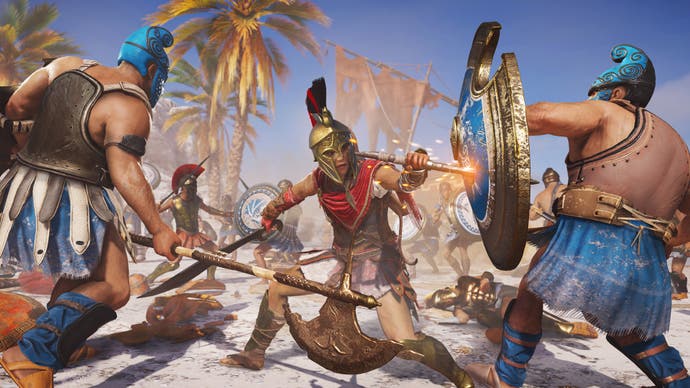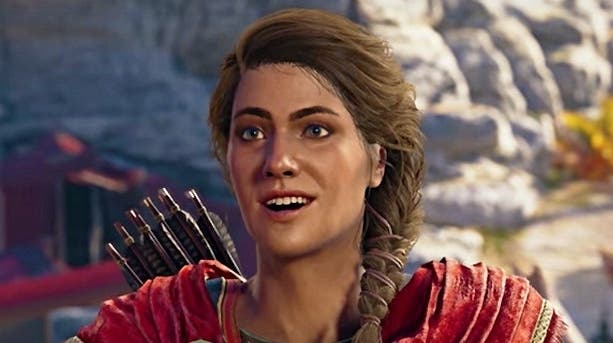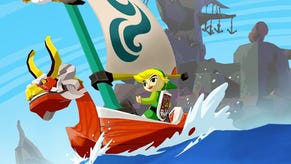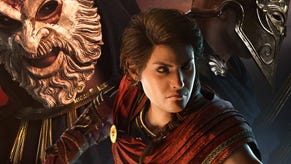Assassin's Creed Odyssey's 'best' ending is its weakest
Achilles feels.
This piece contains spoilers for Assassin's Creed Odyssey.
The main quest of Assassin's Creed Odyssey isn't really about fighting an evil cult. It's not even about settling the fate of the Greek world, though, hey, if you're passing through why not sort that out yeah? Odyssey is a tale of family. Its title evokes the tale of Odysseus trying to return home, and so too is Kassandra. (Oh please, like I played as Alexios.) She's not headed for her literal home really, but rather to her family. Throughout the course of this journey you'll confront your step brother, your father, your actual brother, your mother and uh, your real dad. It's a whole thing. For me though, this isn't the family Kassandra cared about.
The game itself seems to want to push players towards an attempt to repair broken bonds. Forgive your father (he threw you off a cliff as child) and your brother (he's the prodigy of a war-mongering cult) and maybe make peace with your step brother (a blind Spartan nationalist hell bent on killing you at nearly every opportunity). Manage all that and keep your mother safe to be rewarded with a saccharine sweet happy ending where you sit down for dinner.
I did not get this ending.
Because that lot? They weren't my family. Kassandra's family to me were the surrogate family she'd assembled while adrift in Ancient Greece. The troublesome Markos who took her in when she needed it. Little Phoibe who was all too eager to help and was like a sister to Kassandra. Barnabas, Kassandra's dearest friend and god-fearing sailor who never hesitated to help her and stand by her across all of Greece. In the end it's not the nice little villa in Sparta that feels like home but the Adestria, the ship that's carried you around Greece. A big part of the game is collecting officers for your ship, and that felt like an extension of the idea, Kassandra building a new family for herself.

See, your blood relatives can only be embraced if you forgive all their considerable crimes. Their love is deeply conditional. But this unconventional family? This lot are there for Kassandra no matter the weather, without hesitation. As someone who's been distanced from their own family, whose friends have become their one and only support network, this is the aspect that earned Odyssey a place in my heart.
So by comparison to some, my playthrough was an absolute bloodbath. I stabbed my father the first chance I got, having discovered he'd done nothing to redeem himself in the years since his failed attempt to kill me and my brother, instead remaining true to Sparta. I killed my step brother twice since the first time didn't stick and he refused to go in peace. And at the end I killed Alexios for what he'd done to tear my new family apart. I can't recall if Kassandra said it or I just thought it in my head as I drove our grandfather's spear through his throat, but "This is for Phoibe" was uttered.
I didn't care to put back together my original family because, frankly, they were a bunch of arseholes who only redeem themselves if Kassandra does all the work. Meanwhile all around Kassandra was that truer, more caring family. For me this was a game about cutting blood ties, about not letting familial connections control you and about embracing those who are already there for you. Which makes the DLC Legacy of the Blade's attempts to emphasise important bloodlines with a eugenics-like mentality feel all the more out of place beyond the queer erasure.
It's clearly not the intended reading but thanks to the wonders of branching narrative and player choice I was able to happily make that reading of the game for myself. At the end of the main quest only Kassandra's mum remained alive (on good terms with her at least) but that's okay. Her real family was waiting back aboard the ship.
And that's really where Kassandra's and Odysseus' quests differ for me. My Kassandra wasn't trying to return home. She was building a new one for herself.









